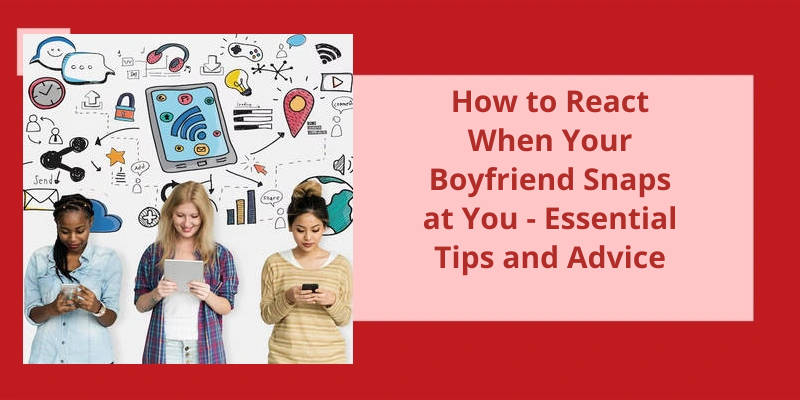Navigating conflicts and disagreements within a relationship can be a challenging task, especially when emotions run high. One such instance is when your boyfriend snaps at you unexpectedly, catching you off guard and leaving you unsure of how to respond. However, it’s important to remember that such outbursts are often brief moments fueled by stress or frustration, rather than a reflection of his true feelings towards you. Instead of dwelling on the moment, it’s crucial to focus on how to react in a manner that promotes understanding and communication. Taking a step back and allowing the heat of the moment to dissipate can help both parties regain their composure and approach the situation with a calmer mindset. By finding ways to cool down and offering a time-out, you create a space for the negative emotions to subside and allow room for positive reconciliation. Ultimately, understanding how to react when your boyfriend snaps at you involves finding the balance between addressing the issue at hand and reinforcing the bonds of love and mutual respect.
What to Do When Someone Snaps at You?
When someone snaps at you, it can be quite jarring and hurtful. However, it’s essential to remember that people often project their own internal struggles onto others. So, if you suspect that someone snapping at you might be indicative of them going through a difficult time, it’s crucial to react with patience and empathy.
One of the best ways to approach such a situation is by calmly asking the person what’s going on. By initiating a calm and non-confrontational conversation, you demonstrate that you’re open to understanding their perspective and willing to resolve any issues together. However, it’s important to be prepared for the possibility that this approach might escalate their angry behavior further.
If their anger continues to intensify despite your attempt at initiating a dialogue, it may be best to disengage temporarily and give them space. Continuing to engage with someone who isn’t yet ready to talk without lashing out might only exacerbate the situation. Taking a step back allows both parties to cool down and gather their thoughts before addressing the issue further.
While patience and empathy are crucial, it’s important to prioritize your own well-being in such situations. If someones snaps become a pattern of disrespectful behavior or if they continually refuse to address the underlying issues, it may be necessary to re-evaluate the dynamics of the relationship. Sometimes, setting boundaries and asserting your own needs is essential for your emotional well-being.
Lastly, it’s important to remember that everyone has their struggles and difficult moments. By responding in a calm and understanding manner, the likelihood of resolving conflicts and strengthening the relationship is increased.
Tips for Managing Your Own Emotions When Someone Snaps at You
When someone snaps at you, it can be challenging to manage your own emotions. However, it’s important to remember that you’ve control over how you react. Here are some essential tips and advice on how to handle such situations:
1. Take a deep breath: Before responding, take a moment to breathe deeply and calm yourself. This simple step can help you avoid reacting impulsively and saying something you might regret.
2. Don’t take it personally: Remember that people’s actions and words are often a reflection of their own emotions and circumstances. It may have nothing to do with you personally. Try not to internalize their behavior and instead focus on maintaining your emotional well-being.
3. Practice empathy: Instead of reacting defensively, try to put yourself in the other person’s shoes. Perhaps they’re going through a tough time or experiencing stress. By understanding their perspective, you can respond with more compassion and patience.
4. Choose your response wisely: Responding with anger or aggression will only escalate the situation. Opt for a calm and assertive approach instead. Communicate your feelings in a respectful manner, using “I” statements to express how their behavior made you feel.
5. Take a break if needed: If you feel overwhelmed, it’s essential to prioritize your emotional well-being. Take a break from the situation, whether it means going for a walk, engaging in a relaxing activity, or seeking support from a trusted friend or family member.
Remember, maintaining your own emotional stability is crucial when dealing with someone who snaps at you. By taking these steps, you can navigate such situations with grace and maintain healthy relationships.
It’s important to address the issue when someone you care about snaps at you. While we all face stressors in our lives, taking it out on others is unacceptable. By setting a clear boundary and expressing your expectations for respectful communication, you can foster a healthier dynamic in your relationship.
What to Do When a Man Snaps at You?
It can be incredibly disheartening and hurtful when your boyfriend snaps at you. No one deserves to be spoken to in a disrespectful or aggressive manner, regardless of the circumstances. It’s essential to address this issue head-on and set a clear boundary. Let him know that you won’t tolerate being snapped at and that it isn’t acceptable behavior in your relationship.
Communication is key in any relationship, so take the time to sit down with your boyfriend and have an open and honest conversation about how his behavior affects you. Share your feelings and let him know that his words have hurt you. By expressing your emotions calmly and assertively, you enable him to understand the impact of his actions on your well-being and the relationship as a whole.
Remind him that you’re there for him and are willing to listen, provided he can communicate with you respectfully. Assure him that you’re a safe space for him to express his emotions, but that it must be done in a manner that doesn’t undermine the respect and love you share.
It’s important to remember that everyone experiences stress and challenges in their lives. However, it isn’t an excuse to take out those frustrations on those closest to us. Encourage your boyfriend to find healthier outlets for his stress, such as exercise, therapy, or engaging in hobbies that bring him joy. By suggesting these alternatives, you show him that you genuinely care about his well-being and want to support him.
When emotions reach their breaking point, individuals may experience a drastic shift in demeanor. This phenomenon, commonly referred to as “snapping,” occurs when one’s calm demeanor dissipates, leaving behind a surge of anger or frustration. The trigger can range from overwhelmingly tense circumstances to insurmountable difficulties, prompting an immediate shift in behavior. An example of this is when an individual was pushed to their limits after being denied access to their own children, causing them to finally snap.
What Does It Mean When Someone Snaps?
When it comes to understanding what it means when someone snaps, it’s crucial to recognize the sudden shift in their demeanor. This occurrence typically arises when an individual reaches their breaking point, where the situation at hand becomes too overwhelming or stressful to maintain composure. The instantaneous transition from calmness to intense anger derives from the mounting tension that becomes unbearable for them to handle.
For instance, consider a scenario where a fathers frustration builds up as he’s constantly denied the opportunity to spend quality time with his children. Despite numerous attempts and negotiations, his ex-partner consistently prevents their children from visiting him. This continuous barrier might trigger a breaking point within him, leading him to snap uncontrollably. The sudden outburst or display of conflict arises as a result of the immense emotional strain that’s accumulated over time.
Reacting defensively or adding fuel to the fire may only exacerbate the tension. Instead, it’s important to remain calm and composed, as heated emotions can hinder effective communication. By maintaining a level-headed approach, it may be possible to identify the underlying cause of the outburst and address it in a constructive manner.
Furthermore, it’s crucial to remember that snapping isn’t always a reflection of ones true character. It’s often an acute reaction triggered by overwhelming circumstances. Consequently, it becomes necessary to provide emotional support and understanding in such instances. Taking the time to listen, validate their feelings, and offering a safe space to express their frustrations can play a significant role in deescalating the situation.
Ultimately, comprehending why someone snaps requires acknowledging the culmination of stress, tension, and difficult circumstances that induce this explosive reaction. Reacting with empathy, patience, and open communication is key to diffusing the situation and ensuring a healthier outcome for all parties involved. By approaching such incidents with understanding and compassion, it becomes possible to mend relationships and work towards a more harmonious dynamic.
It’s not uncommon for couples to experience conflicts or moments of anger. When your boyfriend is mad at you, it’s important to address the situation in a thoughtful and understanding manner. One effective way to start the conversation is by apologizing if you upset him, regardless of your intentions. By acknowledging his emotions and expressing remorse for any hurt or anger caused, you can create a foundation for open communication and seek resolution for the underlying issue.
What Do You Say to Your Boyfriend When He’s Mad at You?
When your boyfriend snaps at you, it can be challenging to know how to react. The key is to handle the situation with empathy and understanding. One essential tip is to apologize if you upset him, even if you didnt mean to. Apologizing shows that you recognize and acknowledge his feelings, and it can help calm the situation. By saying sorry, you convey that you empathize with him and are genuinely sorry for any hurt feelings or anger that your actions may have caused.
However, it’s important to note that an apology shouldnt mean taking sole responsibility for what happened. It’s crucial to dive into the underlying problem and express your point of view at a later time. By doing so, you can work towards resolving the issue at hand and prevent similar situations from arising in the future. But for now, focus on letting your boyfriend know that you’re sorry for any distress your actions may have caused him.
Sometimes, a cooling-off period is needed to allow both of you to regain composure and think more clearly. This doesn’t mean avoiding the issue entirely; it simply means understanding that emotions may be running high, and it’s essential to approach the situation with a clear mind.
However, it’s crucial to remember that everyone has bad days and that his anger may not solely be directed at you. Keep in mind that he may be dealing with other stressors that are affecting his mood. Be patient and try to see the situation from his perspective.
Once the initial tension has subsided, it’s essential to have an open and honest conversation about what happened. Express your feelings and concerns, while also actively listening to your boyfriends perspective. This dialogue can help both of you gain a better understanding of each others emotions and work towards finding a resolution.
By apologizing, providing space, staying patient, and engaging in an honest conversation, you can navigate through the turmoil and strengthen your relationship. Remember, relationships go through ups and downs, but how you handle difficult situations can make all the difference.
Understanding and addressing these triggers is essential for nurturing a healthy and harmonious partnership. By exploring the root causes of your reactions, you can make positive changes that lead to more compassionate and effective communication. So, let’s delve deeper into why you may be snapping at your partner and discover strategies to cultivate a more peaceful dynamic.
Why Do I Keep Snapping at My Partner?
This emotional reaction can manifest as anger, frustration, or irritation, and can often lead to snapping at your partner. Understanding and identifying your triggers is crucial in order to address this recurring behavior. Reflect on your past experiences and traumas that may be contributing to these emotional triggers. It could be related to past relationship dynamics, childhood experiences, or unresolved emotional issues.
Once you’ve identified your triggers, it’s important to communicate them with your partner. Open and honest communication is the key to resolving conflicts and fostering a healthy relationship. By sharing this information, you’re encouraging your partner to be more sensitive and understanding towards your emotional boundaries.
In addition to communication, practicing self-awareness is vital in addressing this issue. Take time to reflect on your emotions and reactions before responding impulsively. Recognize when youre feeling triggered and consciously choose to respond in a calm and collected manner. This will take practice, but over time, you’ll develop the ability to control your reactions and prevent yourself from snapping at your partner.
Furthermore, it’s crucial to take responsibility for your own emotions and seek professional help if needed. If you find that the frequency and intensity of your snapping episodes are becoming overwhelming, consider talking to a therapist or counselor who can provide guidance and support. They can help you delve deeper into the root causes of your emotional triggers and assist you in developing healthier coping mechanisms.
Lastly, remember to practice self-care and prioritize your own emotional well-being. Engage in activities that bring you peace and joy, such as exercising, meditating, or spending time with loved ones. By taking care of yourself, youll be better equipped to handle and manage your emotions in a healthier way, reducing the likelihood of snapping at your partner.
The amygdala, often referred to as the brain’s “alarm system,” plays a crucial role in triggering our instinctive fight or flight response. When faced with a perceived threat, our brain bypasses conscious thought and activates this automatic reaction, leading to impulsive behavior. Understanding the triggers behind these responses is essential to decipher the complex nature of human aggression, as explored in the book “Why We Snap” by Doug Fields. By delving into various scenarios that can provoke such reactions, Fields sheds light on the underlying causes of someone snapping.
What Causes Someone to Snap at You?
Our brains are wired to constantly be on the lookout for threats, and it’s this instinct that can cause someone to snap at you. When faced with a life or death threat, our primal instincts kick in and our bodys automatic response takes over. In these moments, there’s simply no time to think things through and our reactions are purely reflexive.
Another common trigger for snapping is the threat to a loved one. When someone we care deeply about is in danger or facing harm, our protective instincts come to the forefront. This can lead to quick, sometimes aggressive, reactions as we try to ensure the safety and wellbeing of those we love.
Similarly, a threat to our home can also provoke a snapping response. Our home is often a place of safety and comfort, and any threat to it can result in an immediate, defensive reaction. Whether it’s a potential intruder or damage to our property, our instinctual need to protect what’s ours can lead us to snap or lash out.
It’s important to understand that these reactions are automatic and not necessarily a reflection of someones true character. In moments of heightened threat or danger, our instincts take control and our actions may not align with our regular behavior. It’s crucial to approach these situations with empathy and understanding, realizing that the person who snapped may be experiencing an intense fight or flight response.
Strategies for Managing and De-Escalating Situations When Someone Is at Risk of Snapping
- Stay calm and composed
- Listen actively and without judgment
- Provide a safe and non-threatening environment
- Show empathy and validate their feelings
- Use non-confrontational language
- Allow them to express themselves without interruption
- Avoid escalating the situation further
- Redirect their focus to a positive or calming topic
- Offer constructive solutions or suggestions
- Respect their boundaries and personal space
- Involve a trusted person or authority if necessary
- Follow-up and check on their well-being afterwards
Source: Have you ever tried to understand why people snap and …
Conclusion
In conclusion, when faced with a boyfriend who snaps at you, it’s essential to react with poise and composure. While completely preventing such moments may be challenging, one can focus on taking the next appropriate step. Give yourself and your partner some time to cool down, allowing the negative emotions to subside and positive connections to resurface. By practicing emotional regulation and fostering supportive bonds, you can navigate through these snappy moments with grace and maintain a healthy relationship.






